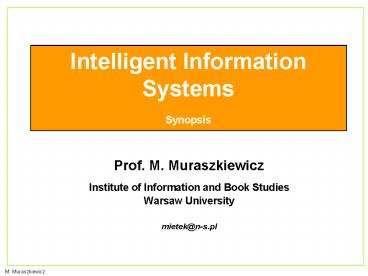Intelligent Information Systems Synopsis
1 / 36
Title:
Intelligent Information Systems Synopsis
Description:
Ability to manipulate objects mentally. Planning. Adaptability. Common Views. M. Muraszkiewicz ... consisting of explicit objects, and of assertions or ... –
Number of Views:43
Avg rating:3.0/5.0
Title: Intelligent Information Systems Synopsis
1
Intelligent Information SystemsSynopsis
- Prof. M. Muraszkiewicz
- Institute of Information and Book Studies
- Warsaw University
- mietek_at_n-s.pl
2
Prologue
3
Motto
The purpose of computing is insight, not
numbers. Richard Hamming
1916 - 1998
4
Table of Contents
- Prologue
- Morphology of Lectures Title
- Where to Place Intelligence?
- Knowledge Representation Methods
- Curriculum
- Epilogue. Lecture Main Thesis.
5
Morphology
6
Key-words
- Intelligence
- Information
- System
- Information system
7
Intelligence
8
Intelligence - Some Quotations
F. Scott Fitzgerald "The test of a
first-rate intelligence is the ability to hold
two opposed ideas in the mind at the same time,
and still retain the ability to
function." Cole's axiom "The sum of
intelligence on the planet is a constant the
population is growing." Albert Edward Wiggam
"Intelligence appears to be the thing that
enables a man to get along without education.
Education enables a man to get along without the
use of his intelligence."
9
Common Views
- Ability to learn
- Discovering relationships and dependencies
- Reasoning and drawing conclusions
- Problems solving
- Ability to manipulate objects mentally
- Planning
- Adaptability
- ...
10
Two Schools
One Intelligence Sir F. Galton Ch.
Spearman H.J. Eysenck A.R. Jensen
Many Intelligences H. Gardner R.J. Sternberg
11
Question 1
Is consciousness a condition sine qua non of
intelligence?
12
Question 2
Can intelligence emerge (be self-born) in complex
enough processing structures equipped with
memory?
13
Question 3
Does Artificial Intelligence (AI) pose ethical
problems?
14
Information
15
Data, Information, Knowledge
- Data sequence of characters
12-01-53
- Information data interpretation
e.g. phone 12-01-53
- Knowledge information bounded by
relationships
e.g. 12-01-53 is Anns phone number
e.g. if one is
sick then one cannot work
16
Epistemological Pyramid
Information combined with experience, context,
interpretation and reflection. Also ability to
classify.
not amenable to computerization
wisdom
?
knowledge
amenable to computerization
information
data
17
Observation
Although we have oceans of data at our disposal,
we are still starving for knowledge.
18
System
19
Algebraic Approach
System lt set of items, set of relations, set of
operations gt
20
Information System.Where to Place Intelligence?
21
IS Generic Functionality
- Storing information / knowledge
- Answering questions
- Knowledge discovery (IS as an epistemological
machine).
22
Information System
There is no widely accepted definition of IS it
depends on those who coin the definition, their
needs, interests, knowledge, etc. The table
offers a skeleton definition 0 not amenable
to intelligence 1 to some extent 2 to
significant extent 3 to very large extent
23
Knowledge Representation
24
Question
Do we discover or invent knowledge?
25
Definition of Knowledge
- There is no widely accepted definition of
knowledge. - Knowledge is related to
- objects
- facts
- events
- procedures
- Itself (meta-knowledge)
Knowledge is experience (A. Einstein)
26
Definition of KR
The term Knowledge Representation is most
commonly used to refer to representations
intended for processing by modern computers, and
particularly for representations consisting of
explicit objects, and of assertions or claims
about them. Representing knowledge in such
explicit form enables computers to draw
conclusions from knowledge already
stored http//en.wikipedia.org/wiki/Knowledge_re
presentation
27
Formal Definition of KR Method
KR lt KR_Description_Language,
KR_Processing_Mechanism including
Inference_Mechanism gt
28
IS, AI, KR - Relationship
KnowledgeRepresentation
Informationsystems (DBMS)
ArtificialIntelligence
29
KR Methods Origins
- Invented by researchers
- Based on solutions worked out by mother nature
30
KR Methods
- Natural language
- Methods used for databases, e.g. UML
- Standard and non-standard logics
- Production rules
- Semantic networks
- Concept graphs
- Ontologies
- Frames, scripts
- Pawlaks rough sets
- XML (?)
- Neural nets
- Genetic algorithms
- ...
31
Curriculum
32
Lectures Objective
The purpose of the lecture is to provide students
with basic knowledge on the ways and means
Artificial Intelligence (AI) can be placed in
Information Systems (IS). The outcome of the
lecture is to draft an IS map (ontology) and to
indicate the spots where and which AI techniques
and solutions can be implanted. The main
focus will be made on Knowledge Representation
(KR) methods. A survey of KR methods will be
made. Classic (mathematical) first order logic
will be used as a reference model and landmark.
Issues related to incompleteness, fuzziness and
uncertainty of information and knowledge will be
tackled. The main KR methods will be illustrated
by case studies of actual information systems.
33
Curriculum (30 30 hrs)
- Introduction
- Basic Notions (data, information, knowledge,
information systems) - Information System Ontology
- Whats Intelligence? Natural and Artificial.
- Knowledge Representation (KR)
- Relationships between DBMS, AI and KR
- Survey of Knowledge Representation Methods
- Knowledge Discovery and Data Mining
- Intelligence Map of an Information System?
- The lecture (30 hrs) goes with a practical
design of intelligent components of an IS to be
done by each student (30 hrs).
34
Epilogue
35
Main Thesis
A discussion on Intelligent Information Systems
is mainly a discussion about methods of Knowledge
Representation with the emphasis on inference.
36
Thank you for your attention































